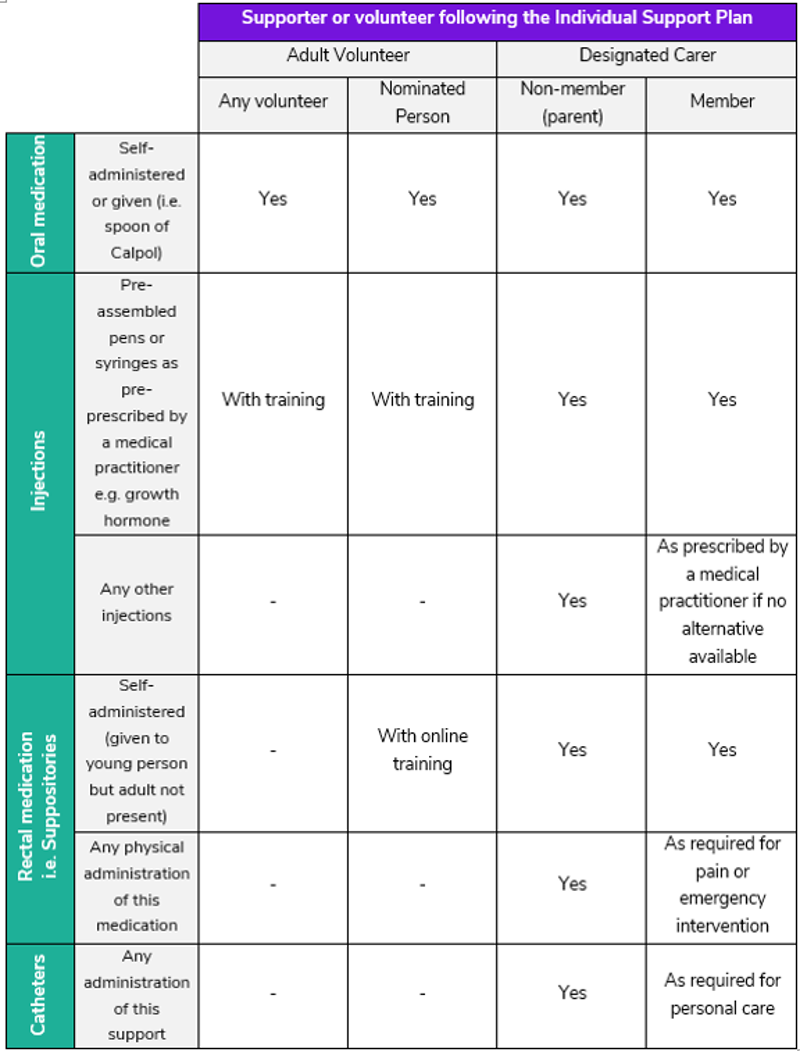8. Guidance on who can provide intimate or personal care support
Contents
- Introduction
- 1. Purpose
- 2. Principles of Intimate Care when working with young people and adults
- 3. Definitions within the Intimate and Personal care policy & Procedures
- 4. People involved in creating an Individual Support Plan – definition of role
- 5. Creating an Individual Support Plan for young people
- 6. Creating a Personal Care Plan for Adult Volunteers
- 7. Intimate & personal care: Support Practices
- 8. Guidance on who can provide intimate or personal care support
- 9. Guidance for Appointments
- 10. Training & Validation
- 11. Specific Safeguarding Considerations
- 12. Further Resources
- 13. Review
- Appendix
8. Guidance on who can provide intimate or personal care support
The tables below set out the personal and intimate personal care that individuals are likely to require within The Scouts and what care all adult volunteers, the Nominated Person and Designated Carer may facilitate. For clarity of support common aspects of care are included within the continuum of care; these are not considered intimate or personal care and you will see all adult volunteers are able to offer this support.
A Designated Carer may administer all aspects of personal or intimate care if agreed by the individual receiving care and parent/carer where appropriate.
Guidance on accepted forms of medical training or experience is contained within section 9.
8.1 - Eating and Drinking
Support for eating and drinking can be very straightforward for many young people. It might involve reminders of using a knife and fork or in some circumstances support in other ways. Some young people require complex medical support to enable them to digest their food.

8.2 - Teeth, Skin, Hair and Nails
Supporting a young person with teeth, skin, hair or nails is often infrequent in The Scouts and even on Nights Away activities may require minimal input. For clarity the typical activities are listed below. For many activities any volunteer can support, and often do, such as reminding a group of young people to brush their teeth in the morning and at the end of the day.

8.3 - Bathing & Showering
Supporting a young person with their bathing and showering is often infrequent in The Scouts and usually only applies when on Nights Away activities or during Water Activities. For some young people this might simply involve remaining outside the shower cubicle and verbally prompting them through the process of showering. It might involve handing them a towel or giving them soap at the appropriate time. Some young people may require intimate physical support.

8.4 - Dressing or Undressing
Supporting a young person with dressing and undressing is common in early childhood, but can be a tricky skill to master. Sometimes reminders are needed to help with sequencing (pants then trousers) but sometimes physical support is needed. On their developmental journey young people should be encouraged to take increasing independence in dressing. By working with parents and carers you will know the different skills they are developing.

8.5 - Toileting
Supporting a young person with their toileting needs is a very common occurrence throughout child development. We all need support when we are first born to care for our most basic needs including changing. For some young people their additional needs require this support throughout their development or require specialist medical care such as cleaning and changing of colostomy bags.

8.6 - Menstrual Care
Providing menstrual care for young people can be a sensitive subject depending on the experience of the volunteer or family member. Some professionals find this area of personal care difficult to support; it’s important to follow the same principles above, listening to the individual young person and their family and putting simple routines in place to support them. This might be as simple as having a supply of sanitary products and reminding the young person of sanitary hygiene at certain times each month. However in some circumstances young people require additional support to help them.

8.7 - Medication
Giving of medication should only be undertaken under strict instructions and permissions from the parents/guardian of the young person. Different medications require different levels of training, experience and some require professional medical experience to be able to give within The Scouts. Remember for any medication you must record the medication given in the care log - date, time, does given, who gave it and the young person’s name.
